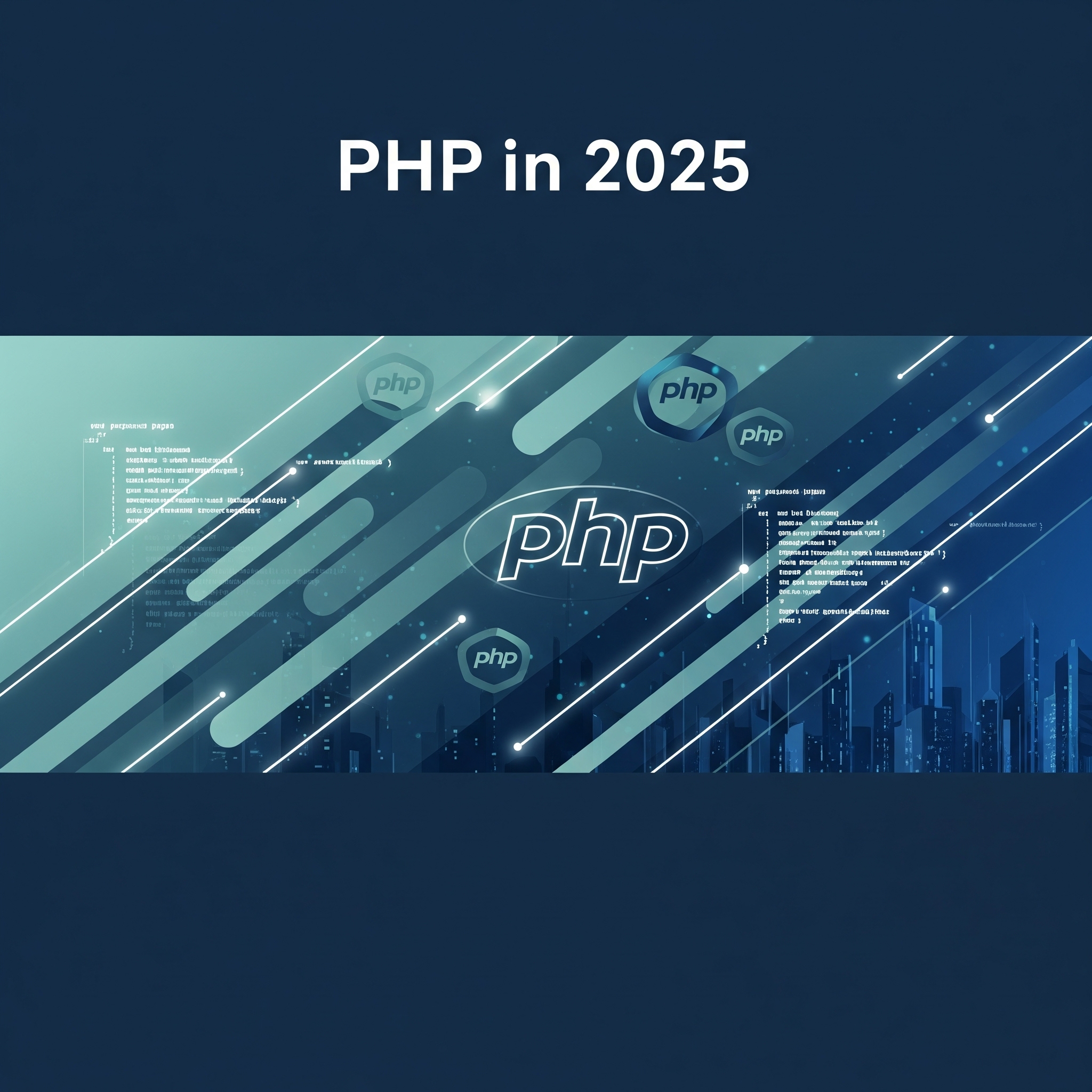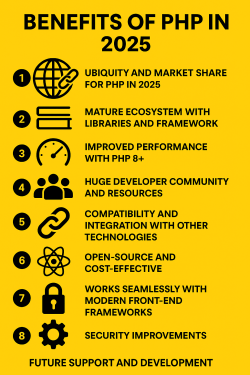PHP in 2025: Still A Smart and Effective Choice
May 29, 2025

PHP in 2025 continues to be a driving force in modern web development. Despite the emergence of newer languages and frameworks, PHP has not only endured—it has evolved to meet the needs of today’s web. With decades of real-world usage, an active developer community, and modern tooling, PHP remains a powerful, flexible, and highly relevant choice for businesses and developers alike.
At The Bridge Digital, we’re frequently asked whether PHP is still a smart choice for current projects. The answer is a resounding yes—PHP in 2025 is as relevant and capable as ever. Here’s why today’s PHP continues to thrive and deliver outstanding value.
1. Ubiquity and Market Share for PHP in 2025
As of 2025, PHP powers over 75% of websites worldwide—including major platforms like WordPress, Facebook, and Wikipedia. This widespread adoption ensures that PHP in 2025 is supported by a massive developer base, making it easy to find talent, troubleshoot issues, and onboard new team members.
For businesses, this familiarity and ubiquity translate into faster time-to-market and easier system maintenance, whether building something new or modernizing a legacy system. Educational institutions continue teaching PHP because its practical use cases in real-world web development remain critical.
2. A Mature Ecosystem and Frameworks
PHP in 2025 offers a mature ecosystem filled with powerful libraries and frameworks, including Symfony, Laravel, and Laminas. These frameworks streamline development, enforce best practices, and help teams build scalable, secure applications more efficiently. Laravel in particular continues to shine in 2025 for its elegant syntax and vibrant community.
Thanks to this robust ecosystem, PHP projects today can easily integrate modern tooling and maintain high code quality. Composer, PHP’s dependable package manager, plays a central role in managing dependencies and ensuring smooth development workflows across teams and projects.
 3. Modern Performance Capabilities
3. Modern Performance Capabilities
PHP in 2025 has significantly improved performance, driven by innovations like PHP 8’s JIT (Just-In-Time) compilation, improved memory usage, and enhanced concurrency. These improvements allow PHP to handle modern web workloads with ease, from real-time dashboards and APIs to AI-powered applications working alongside microservices in languages like Python or Node.js.
With tools like OPcache, which caches compiled PHP scripts for faster execution, and optimized server configurations, PHP applications now deliver faster response times, enhanced scalability, and improved user experiences. PHP in 2025 isn’t just keeping up—it’s often the engine behind high-performance, content-rich digital platforms.
4. A Thriving Developer Community
One of PHP’s greatest strengths is its active, global community. In 2025, thousands of developers contribute to the evolution of PHP, whether by maintaining libraries, writing documentation, or participating in conferences like PHP[tek], SymfonyWorld, and Laracon. This vibrant ecosystem ensures there’s always a wealth of knowledge, tools, and support for PHP developers, from freelancers to large enterprise teams.
5. Easy Integration with Other Technologies
PHP in 2025 continues to excel at integration. Whether connecting with relational databases like MySQL and PostgreSQL, NoSQL solutions like MongoDB, or third-party APIs, PHP is built for flexibility. Its compatibility with REST and GraphQL APIs, payment gateways, authentication providers, and SaaS platforms like Salesforce and Stripe makes it a go-to choice for building composite digital ecosystems that support modern workflows.
This interoperability means businesses can build unified platforms where systems communicate seamlessly, making PHP an essential tool for digital transformation strategies in 2025.
6. Affordable and Open-Source
As a free, open-source platform, PHP in 2025 offers exceptional value for businesses of all sizes. With no licensing fees and a vast library of free tools and frameworks, companies can reduce costs while accelerating development. Hosting PHP applications is straightforward and affordable, whether on shared servers or scalable cloud platforms that support modern deployment strategies.
Startups and small businesses appreciate the cost-effectiveness of PHP, while enterprises value its support for complex architectures and high-availability configurations that deliver business resilience.
7. Seamless Integration with React and Modern Front-Ends
Modern web applications often pair PHP with front-end frameworks like React, Vue, and others. PHP in 2025 makes this integration smooth, supporting API-first development with RESTful and GraphQL endpoints. Headless CMS solutions like Drupal and WordPress, driven by PHP, allow teams to build dynamic, decoupled architectures that combine robust backends with interactive JavaScript frontends.
This seamless collaboration between PHP and modern front-ends makes it easier to decouple legacy applications, progressively modernize codebases, and deliver exceptional user experiences across platforms.
8. Security Built-In
Security is a top priority in 2025, and PHP doesn’t disappoint. Modern PHP frameworks like Symfony and Laravel come with built-in protections against common threats, including XSS, CSRF, and SQL injection. Best practices like input sanitization and encryption are standard, and many PHP projects follow OWASP guidelines to ensure secure, compliant applications from the ground up.
9. Continued Evolution and Innovation
PHP in 2025 is evolving to meet the needs of modern development. Recent updates introduced features like improved typing, attributes, enums, and fibers for asynchronous programming. Backed by the PHP Foundation and a steady release cycle, PHP continues to innovate, ensuring it remains a vital language for years to come.
10. Cloud and DevOps Ready
PHP in 2025 works effortlessly in cloud and DevOps environments. With native support for Docker, Kubernetes, and CI/CD pipelines using GitHub Actions and GitLab CI, PHP can scale efficiently on modern infrastructure. PHP apps are cloud-ready, running on platforms like AWS and Azure, with tools like Bref enabling serverless deployments for increased agility.
Conclusion
PHP in 2025 is faster, more secure, and more versatile than ever. Whether you’re building a new platform, modernizing legacy code, or scaling an enterprise application, PHP continues to deliver robust, scalable solutions with excellent ROI. From startups to global enterprises, it remains a trusted choice for web development in an increasingly connected world.
Ready to bring your PHP project to life? Contact The Bridge Digital today to speak with our expert PHP team. We’ll help you plan, build, and scale high-performing applications that move your business forward.
